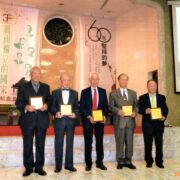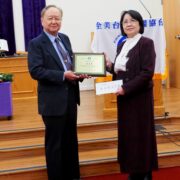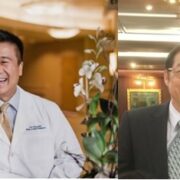戒嚴時期關注台灣人權的國際力量
International Contributors to the Struggle for Taiwan Human Rights in the Martial Law Period
By艾琳達Linda Gail Arrigo
2020年12月9日 December 9, 2020
遷黨回台
到了1980年代中期,許多受美國冷戰政策支持的反共獨裁政權開始產生變化。我們無法得知——海外推動臺灣在戒嚴中成立反對黨的建黨運動;以及「黨外中央後援會」1986年9月28日在圓山大飯店召開會議,突然宣布組建民主進步黨——兩者間的確切關係,但我們能知道的是這並非從臺灣開始,臺灣所發生的只是此模式的一部分。
菲律賓反對派領袖小艾奎諾(Benigno Aquino Jr.)於1983年8月21日搭機返國,卻立刻在下機時遭軍方人員開槍射殺。不過在1986年初,一場由大眾發起、近乎不流血的革命將馬可仕(Ferdinand Marcos)趕下總統之位,艾奎諾的遺孀柯拉蓉(Corazon Aquino)當選總統。無獨有偶,南韓的金大中也在1985年返國,不過只是被軟禁在家;南韓獨裁政權之後垮台,獨裁軍人全斗煥最終受到司法審判。接著,《美麗島雜誌》五人小組一員、流亡海外的許信良,也被其顧問敦促循此歷史前例回台;1986年3月,海外臺灣人支持者在紐約宣布建黨(台灣民主黨),並矢言將該黨遷回臺灣。許信良偕謝聰敏、林水泉一同入黨,當時身在美國的梅心怡則擔任英文發言人。據報導,台裔美國人為此行動籌募了50萬美元,支付至少50張機票錢,送長久以來被臺灣當局禁止入境的「不受歡迎人物」——王澤民(James Collignon)神父、曾為1980年被判刑14年的留學生葉島蕾奔走的Terry Caine、艾琳達,還有被列入黑名單的台美人們——嘗試在1986年11月下旬闖關入境臺灣。與他們同行者,還有日本記者若宮清;艾奎諾走下飛機時,若宮清就在他身後,為其謀殺案作證,若宮清亦曾陪同金大中回國。
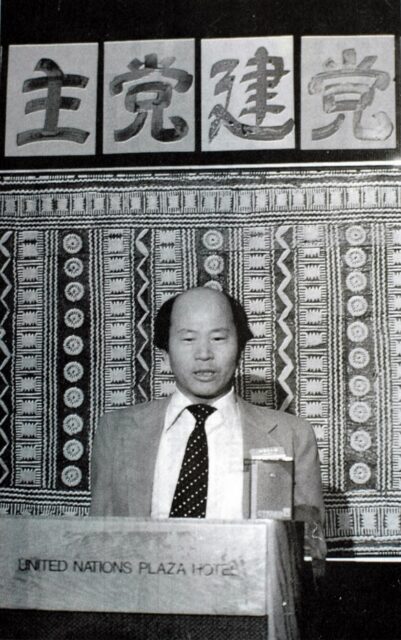
儘管遭遇鎮壓,眾人在1979年美麗島民主運動後依然屢仆屢起,1986年民主進步黨成立,即是反戒嚴抗爭的重大里程碑。而在國民黨試圖維持其對國產、政治權力及國際政策的掌控下,進一步的進展緩慢而停滯。甚至到2020年的今日,這場抗爭還沒完全劃下句點。但是,回顧那些前景黯淡,成功希望似乎渺茫的日子,在當時仍敢於挑戰政權的人們,可能面臨被逮捕、酷刑、處決,甚至是子女被殺害的遭遇,可以知道我們已走過漫漫長路。在這段過程中,尤其是早期致力於捍衛人權的人們——不僅在本國,同時也面向全世界——都扮演著重要角色,也為臺灣帶來改變。
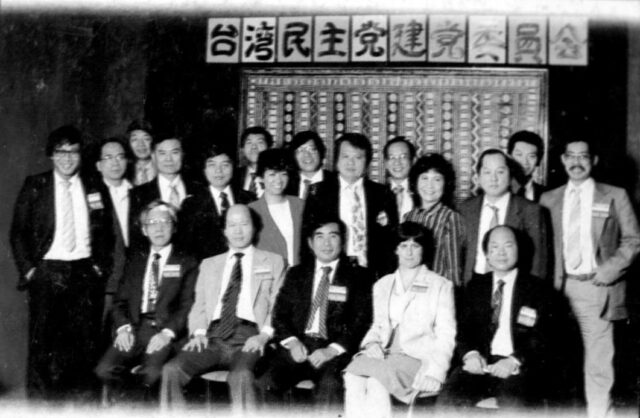
最前排左起:林水泉,許信良,謝聰敏,艾琳達,許國泰
第二排左起:田台仁,XXX, XXX, XXX, 泰山嫂,李登山, 文雄嫂,賴文雄,洪哲勝Cary Hong standing far right in second row.
第三排左起: XXX, 楊次雄, 康泰山, XXX, 楊明皓
“Take the Party Back to Taiwan”
By the mid-1980’s there was change stirring in many of the anti-communist dictatorships propped up by American Cold War policies. We cannot know the precise relationship between the overseas movement pushing for formation of an opposition party in Taiwan despite continuing martial law, and the sudden meeting at the Grand Hotel and the announcement of the Democratic Progressive Party founding on September 28, 1986. But we can know that it was part of a pattern that did not begin in Taiwan.
Opposition leader Benigno Aquino Jr. returned to the Philippines on August 21, 1983, and was shot as soon as he was taken off the plane by military personnel. However, by early 1986, a popular and nearby bloodless uprising had removed Marcos from the presidency and elected Cory Aquino, his widow. Kim Dae-jung similarly returned to South Korea in 1985, but was only put under house arrest; the dictatorship later fell, and in fact the dictator General Chun Doo-hwan was eventually put on trial.
Next, advisors to the exiled Hsu Hsin-liang, one of the leadership of five of Formosa Magazine, urged him to follow this precedent of history; overseas Taiwanese supporters announced formation of a party in New York in March 1986, vowing to take it back to Taiwan. Hsu was joined by former political prisoners Hsieh Tsung-min and Lin Shui-chuan. Lynn Miles, now in the U.S., served as press secretary. Taiwanese-Americans reportedly raised half a million dollars for this effort.
At least fifty airplane seats were paid for, to take those long persona non grata in Taiwan, like Father James Collignon, Terry Caine (who campaigned for Rita Yeh Dao-lei of University of Michigan, sentenced to 14 years in 1980), and Linda Gail Arrigo, as well as black-listed Taiwanese-Americans, to attempt to enter Taiwan in late November 1986. With them also was Kiyoshi Wakamiya, a Japanese journalist who had been just behind Aquino as he stepped off the plane and gave witness to Aquino’s murder. Wakamiya had accompanied Kim Dae-jung as well.
The 1986 founding of the Democratic Progressive Party was an important milestone in the struggle against martial law, one that in personnel continuity followed on the 1979 democratic movement, despite the repression that had been encountered. Further progress was slow and halting, as the Kuomintang sought to keep its grip on the national treasury, political power, and international policy. That struggle is not entirely past, even to 2020. However, looking back at the days when the outlook was bleak and the odds seemed insurmountable, but still people dared to challenge the regime and potentially suffer arrest, torture, execution, and, unimaginably, even the murder of their children, we can know that a long road has been travelled. In this process, especially in the early period, persons committed to protecting human rights – not just in their own countries but throughout the world – have played an important role and made a difference for Taiwan.
Source from Linda Gail Arrigo艾琳達
Posted in 12/2020


